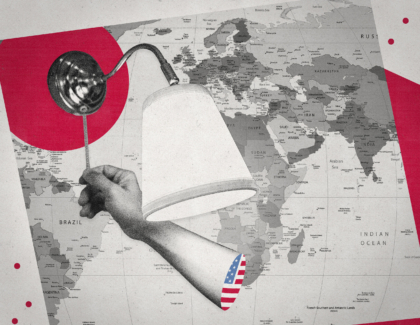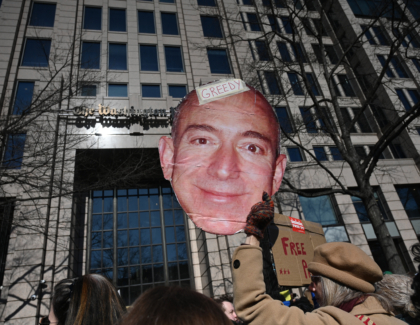Sign up for the daily CJR newsletter.
At the end of January, an email chain circulated in the Czech Republic, claiming that the COVID-19 coronavirus had been registered with the United States Patent Office in 2003. Another email went around in February, suggesting that it was a targeted pandemic created by Americans: the United States, supposedly near bankruptcy, wanted to sell a profitable vaccine. Within days, Czech outlets were filled with conspiracies about the origins of the virus. The stories, as it turned out, could be easily traced back to Russian media.
Jakub Kalenský, a senior fellow at the Atlantic Council’s Digital Forensic Research Lab, was on the ground. “It was mostly these messages about the coronavirus being the biological weapon of the United States,” he said. Some reports stated that it was developed to eliminate Asians, or that Big Pharma is overinflating the scale of infection to increase sales. Russian disinformers claimed that Pope Francis has coronavirus. China has also spread disinformation: a spokesman for the Ministry of Foreign Affairs circulated a theory that COVID-19 is an American disease, possibly introduced by members of the United States Army who visited Wuhan. Sifting through the messages, Kalenský sought translation help from a volunteer group called the Czech Elves, so-named because of their battle with online “trolls,” There’s a lot to get through. “When people are influenced by strong emotions, they are most likely to share information that isn’t right,” he said.
ICYMI: Pandemic in the right-wing mediasphere
Kalenský, who is 37, has observed that a lot of the disinformation is stoking “anti-Western, anti-European, and anti-US sentiments.” Opponents of NATO, for instance, have been using the pandemic as an opportunity to spread dissent; Kalenský’s team found that false claims about a multinational military exercise that will bring the coronavirus to the Baltic states have appeared in dozens of outlets across Europe. A colleague in Latvia put together a report tracing these claims to agents in Russia, left-wing politicians in Germany, and an anonymous internet user in Latvia. “When you are disinforming, you are precisely trying to exploit these situations when people are less rational,” he explained.
Kalenský has been tracking disinformation for years. He grew up in the Czech Republic and studied Russian in college—he loved Fyodor Dostoevsky—and after graduating, he worked as a journalist. The politics of his country soon grew tense: in 2013, Miloš Zeman, a pro-Kremlin candidate, was elected president; the next year, Russia invaded Crimea, the Ukrainian Civil War started, and pro-Russia separatist rebels shot down Malaysian Airlines Flight 17. Kalenský began to notice pseudo-independent news outlets popping up around Europe, presenting themselves as alternatives to the mainstream media. “They were basically parroting Russian lies about fascists in Ukraine,” he said.
In 2015, Kalenský was reading a Czech news site, HlídacíPes (“Watchdog”), when he noticed an announcement about a team being formed by the European Union called East StratCom. Its aim would be tackling disinformation. He fit the job description: seeking experts with knowledge of Russian and experience in media. When he started, East StratCom developed a three-pronged approach: proactive communication that promoted Western liberal values in Eastern Europe, strengthening independent journalism, and countering disinformation through awareness campaigns. Kalenský took the lead on part three. “The idea was, if you manage to raise awareness about what the disinformation campaign is, how it works, what it’s trying to achieve through what channels and with which messages, the more people will be vaccinated against it,” he said. To do so, East StratCom developed products that would reveal fake news campaigns, including EU vs. Disinfo, a website with a disinformer database, and Disinformation Review, a weekly newsletter.
Kalenský wanted the newsletter to be short and easy to read—unlike most of the reports that come out of government agencies. He also tried to keep the tone light. One post stated bluntly that Americans didn’t invent the distinction between Sunni and Shia Islam; another debunked a notion, published in a viral story, that a “brothel for zoophiles” would be opening in Denmark. Ironically, the latter observed, “Dan Jørgensen, whose name in the article for some reason is distorted into Vlad Jorgensen, was the initiator of a law which in 2015 lay a ban on sex with animals.”
Kalenský’s newsletter was read by officials in Europe and Washington, DC. “We were trying to reach the organic multipliers,” he said. But he quickly learned that combatting disinformation has many obstacles. “Any bureaucracy—and especially EU bureaucracy—considers the word ‘new’ to be something they try to avoid,” he said. “We weren’t the most popular team in Brussels.” After Kalenský’s newsletter mistakenly included several articles from legitimate Dutch newspapers, the Dutch Lower House of Parliament adopted a motion to disband his project; its mandate shrunk to focus only on disinformation from Kremlin-linked sources.
The biggest challenge was balancing the war against disinformation with freedom of speech. East StratCom’s mandate has never been to ban anything, but instead to show how disinformation is disseminated. Without the ability to impose sanctions or regulate tech platforms—let alone enact a law against believing lies—Kalenský felt the limits of his power. “People think if they just focus on media literacy, the problem will be solved,” he said. “This is, unfortunately, nonsense.”
In 2018, Kalenský left East StratCom for the Atlantic Council, where he’s been advocating sanctions against sharing disinformation. Take, for instance, Vladimir Solovyov, a Russian television host, Kalenský said. “Solovyov spurs hatred against the West two or three days per week. And after the show, he sits on his plane and enjoys his villa in Italy.” Western companies are among the top advertisers on Russian TV, Kalenský pointed out. Why not penalize irresponsible use of Russian airtime?
Kalenský believes the European Union should conduct opinion polls of member states to assess the effectiveness of disinformation campaigns and expand efforts like East StratCom. The aim, he argues, should be to more systematically analyze the damage caused by fake news, rather than just monitor phony claims about COVID-19 as they stream in. “If a strategy doesn’t bring you the results you want,” he said, “it’s probably a bad strategy.”
THE MEDIA TODAY: How journalists around the world are covering the coronavirus
Has America ever needed a media defender more than now? Help us by joining CJR today.







